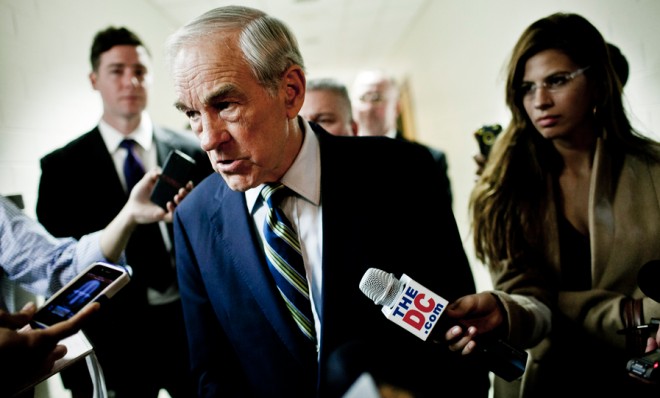Why Ron Paul is slamming Boston's response to the bombings
The libertarian says the military-style lockdown "should frighten us as much or more than the attack itself"

A free daily email with the biggest news stories of the day – and the best features from TheWeek.com
You are now subscribed
Your newsletter sign-up was successful
Criticizing the Boston Police Department, which has been hailed for capturing Marathon bombing suspect Dzhokhar Tsarnaev, isn't exactly a PC move. Here, however, is former Rep. Ron Paul (R-Texas) on libertarian Lew Rockwell's site:
These were not the scenes from a military coup in a far off banana republic, but rather the scenes just over a week ago in Boston as the United States got a taste of martial law. The ostensible reason for the military-style takeover of parts of Boston was that the accused perpetrator of a horrific crime was on the loose. The Boston bombing provided the opportunity for the government to turn what should have been a police investigation into a military-style occupation of an American city. This unprecedented move should frighten us as much or more than the attack itself. [LewRockwell.com]
He goes on to criticize our modern "surveillance state," and argues that "we have been conditioned to believe that the job of the government is to keep us safe, but in reality the job of the government is to protect our liberties."
While Paul appears to be alone in equating the reaction to the bombings with the bombings themselves, plenty of commentators from across the political spectrum have voiced objections to how law enforcement shut down the city of Boston. Comedian Bill Maher warned of a creeping "police state" on his show a few days ago, according to Politico.
The Week
Escape your echo chamber. Get the facts behind the news, plus analysis from multiple perspectives.

Sign up for The Week's Free Newsletters
From our morning news briefing to a weekly Good News Newsletter, get the best of The Week delivered directly to your inbox.
From our morning news briefing to a weekly Good News Newsletter, get the best of The Week delivered directly to your inbox.
And others have said the government is prone to overreaction any time terrorism is involved. "Whenever the word 'terrorist' is mentioned in this country, reason tends to go out the window, and many other things go with it, too, such as intellectual consistency, a respect for civil liberties, and a sense of proportion," wrote John Cassidy a couple of weeks ago at The New Yorker.
Ross Douthat at The New York Times argues that such reactions could set a worrisome precedent if terrorist attacks become more common:
Because the Marathon bombing was such an unusual event, the city of Boston could muster a sweeping, almost crazy-seeming response without worrying that it would find itself having to do exactly the same thing six months later. But if such attacks started happening more frequently, as they obviously very well could, then last Friday’s precedent would put public officials across the country in an extremely uncomfortable bind: Repeatedly reproducing the lockdown might seem like a non-starter, yet not matching what Boston did would open you up to all kinds of scapegoating if, say, an on-the-loose bomber struck again. [The New York Times]
Last week, Massachusetts Governor Deval Patrick (D) defended the city's response, telling The Boston Globe, "I think we did what we should have done and were supposed to do with the always-imperfect information that you have at the time."
A free daily email with the biggest news stories of the day – and the best features from TheWeek.com
Keith Wagstaff is a staff writer at TheWeek.com covering politics and current events. He has previously written for such publications as TIME, Details, VICE, and the Village Voice.
-
 Bad Bunny’s Super Bowl: A win for unity
Bad Bunny’s Super Bowl: A win for unityFeature The global superstar's halftime show was a celebration for everyone to enjoy
-
 Book reviews: ‘Bonfire of the Murdochs’ and ‘The Typewriter and the Guillotine’
Book reviews: ‘Bonfire of the Murdochs’ and ‘The Typewriter and the Guillotine’Feature New insights into the Murdoch family’s turmoil and a renowned journalist’s time in pre-World War II Paris
-
 Witkoff and Kushner tackle Ukraine, Iran in Geneva
Witkoff and Kushner tackle Ukraine, Iran in GenevaSpeed Read Steve Witkoff and Jared Kushner held negotiations aimed at securing a nuclear deal with Iran and an end to Russia’s war in Ukraine